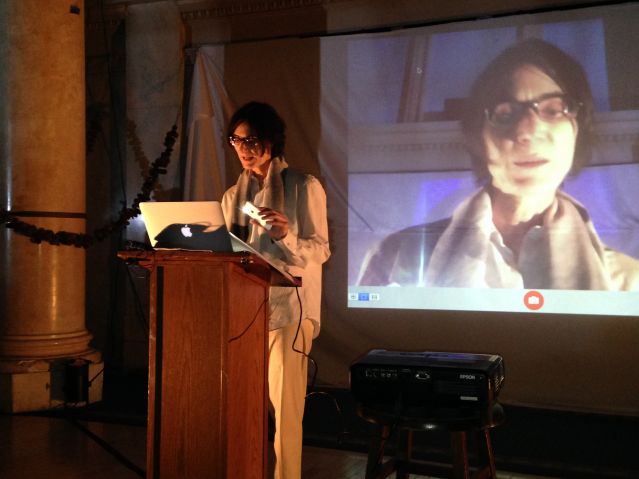Ann Pellegrini, Professor, Performance Studies, Social & Cultural Analysis, New York University Man is wolf to man. This message was delivered with bite by a dramatic reading of Freud’s Civilization and Its Discontents (Das Unbehagen in der Kultur) Saturday night at Judson Memorial Church in New York City. Although written in the aftermath of WWI (1930), organizers of the event declared that Freud’s seminal work remained the definitive text on human destructiveness. Admission was gratis, attendees greeted with a banquet table of complimentary cakes and wine.

Ann Pellegrini, Professor, Performance Studies, Social & Cultural Analysis, New York University
Man is wolf to man. This message was delivered with bite by a dramatic reading of Freud’s Civilization and Its Discontents (Das Unbehagen in der Kultur) Saturday night at Judson Memorial Church in New York City. Although written in the aftermath of WWI (1930), organizers of the event declared that Freud’s seminal work remained the definitive text on human destructiveness. Admission was gratis, attendees greeted with a banquet table of complimentary cakes and wine.
The astonishing performance was staged in response to the beheadings, school shootings, the racially motivated murders of Trayvon Martin and Michael Brown, and other appalling acts of violence that marred 2014. Humans are not gentle creatures, but rather sophisticated animals endowed with formidable aggressiveness. People gain aggression in numbers, too, much like a pack dogs or what the inventor of psychoanalysis called the herd.
In these days of darkness, the staging of Civilization and Its Discontents provided a cultural space for meditative reflection on the causes of human misery and thought toward curative measures. The production website boldly declares: “We continue to meet the enemy...and it is us.”
You, my reader, no doubt, receive this assertion with the same horror you might experience witnessing a child torture an insect. Yet the urge to destroy is part of our constitution, argued Freud, the inclination of human beings to be aggressive toward one another -- the greatest impediment to civilization. Freud describes a fundamental tension between civilization’s demands for instinctual repression and, railing against it, the individual's quest for instinctual expression. Because civilization constricts our freedom in this way, it instills within us feelings of discontent, a word first translated from the German as “discomfort.”
But there is more: the struggle for civilization is further thwarted when humans disavow their own inherent aggression. When these parts of oneself go unrecognized or denied, they are more likely to possess the individual in acts of self-destruction or those of brutality against fellow human beings. Our fear of own our predatory instinct magnifies it. Fear makes the wolf bigger, its fangs more treacherous. Taming the beast requires claiming it.
In The Ego and The Id (1923), Freud wrote that the aggressive instinct is the death drive deflected outward. Furthermore, the death drive operates silently. This theatrical event brought voice to its muteness. And one remarkable aspect of the evening ensued: the crowd responded with open hostility. Coat pockets were rifled through, possessions stolen along with four bottles of wine. The set was destabilized by audience members, cakes torn apart at the ceremonial table. One man angrily demanded a chocolate cigar. Old ladies threw programs at one producer as they stormed out. Strikingly, our subject matter was enacted right before us as if reflected in a mirror: we were met head on by discontent wolves. Was this aggressiveness induced by the sensory disorientation caused by the performance -- the pools of darkness, harsh lighting and discordant sounds -- or was it latent affect in the audience, an arousal, just awaiting the vehicle through which to express itself?
"We gave it away for free and unleashed the preOedipal in the audience!" stated producer Tracy Morgan. "Not surprisingly we were met with powerful demands, bitter complaints, and a few wonton displays of frustration: the audience became her majesty the baby. Next performance we're charging a few bucks, imposing more civilization. Nothing in this life is free and we were understandably punished by some for propping up that illusion!"

The Birdcage as guilt, superego as nude statue
The event was directed by Dennis Yueh-Yeh Li of The Living Theatre who said humans too easily forget the power of what Freud called Eros. We loose sight of our instinct for love and our basic need to be loved. We then succumb to the lament of the lone wolf: feelings of aloneness in an alienating world.
Yueh-Yeh Li described the production as a “performative reading.” Performative words are words that do something in the social sphere, according to the philosopher J.L. Austin. This recitation was psychoanalysis that did something: it created an intervention reaching beyond the consulting room into a shared public arena. The event was psychology for the people, inviting homeless people in from off the street.
The recitation was performed in the avant-garde style long connected with the landmark church. The nave and balcony were constructed into different performing arenas: readers were suspended from a 40-foot ladder, some declaimed Freud’s words from the confines of a giant birdcage before the altar, some spoke from a podium with their face projected on the wall behind them. The 50 performers wore bare feet and garments of virginal white (or the sheep’s clothing of a disguised wolf?)
Among the readers were Iraq war veterans, former UN Security Council member, Tom Carter, war correspondent Elizabeth Rubin, Rabbi Andy Bachman, the philosopher Simon Critchley, Pulitzer-prize winning novelists, celebrated intellectuals including Muriel Dimen and Joan Copjec, along with poets and musical composers.
One performer, psychohistorian Charles Strozier, joked that Freud rolled over in his grave to hear the cacophony of his words read simultaneously in two languages (its original German, as well as English), and the chapters out of sequence. Although I thought it å propos considering during the Victorian era in which Freud lived psychoanalysis was an avant-garde science.
The theater is a symptom of history, some have written. It holds up a mirror to culture somewhat fractured for what it sees. In our troubled times, FreudOutLoud turns our gaze inward to an examination of the way we ourselves, too, are fractured and in recognition of how this splintered state is one shared by all humanity.
___________________________
Civilization and It’s Discontents: A Marathon Reading, produced by New Books in Psychoanalysis and www.FreudOutLoud.com
Contact: FREUDOUTLOUD@GMAIL.COM
<><><>
Follow me: http://www.twitter.com/mollycastelloe




